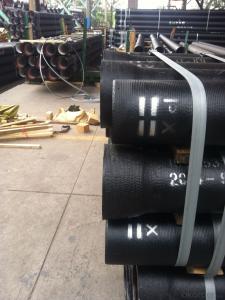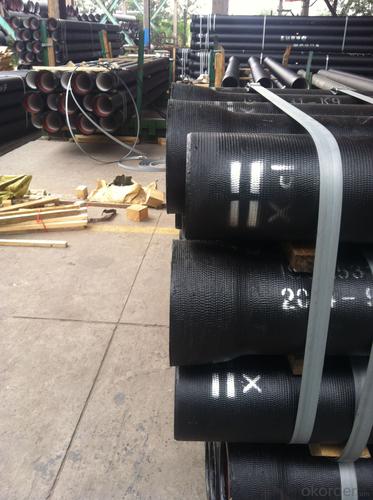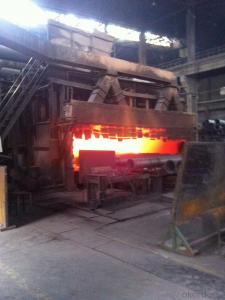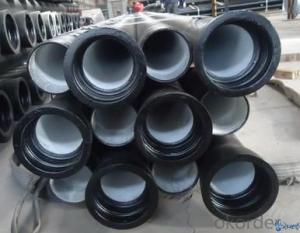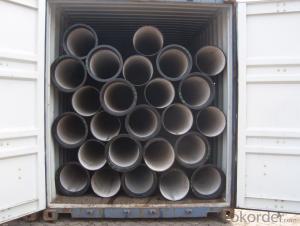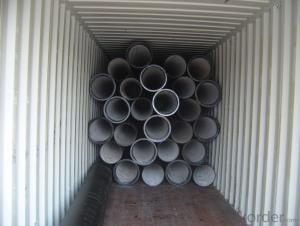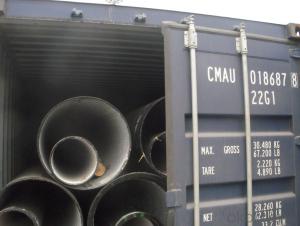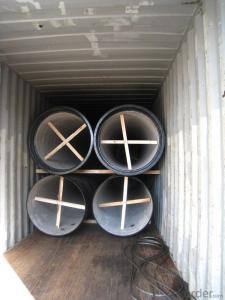DUCTILE IRON PIPES AND PIPE FITTINGS K8 CLASS DN1000
- Loading Port:
- Tianjin
- Payment Terms:
- TT OR LC
- Min Order Qty:
- 22 pc
- Supply Capability:
- 3000 pc/month
OKorder Service Pledge
OKorder Financial Service
You Might Also Like
Material : Ductile Cast Iron
Size Range : DN 80mm to DN 2000mm
Unit Effective Length : 6m or 5.7m
Manufacture Standard: ISO 2531:1998/ EN 545:2006/EN 598:2007
Annual capacity : 200,000 tons
Coating Exterior: Zinc 130g/m2 according to ISO 8179-1 and bitumen coating 70 microns.
Cement Interior: Portland Cement/ High Alumina Cement/ Sulphate Resisting Cement Lining according to ISO 4179
Special requirements on external coating and internal lining can be applied
We also provide accessories such as SBR/EPDM rubber gaskets, lubricant paste, pipe caps, PE sleeves, etc.
Additional Parts:
Each pipe is strictly inspected according to related standard to ensure permanently high performance.
Easy Installation at site and service free for life
Long Service Lifespan
Quotation will arrive you within 24hours once we get your inquiry.
We guarantee offering you a competitive price.
A copy of original inspection reports of pipes will be offered after shipment.
Photos of loading process will be sent to the customer after shipment effect.
We will follow-up the delivery progress after shipment effect and update to the customer on weekly basis.
- Q: How do ductile iron pipes handle water hammer in high-rise buildings?
- Ductile iron pipes are known for their durability and strength, making them an excellent choice for handling water hammer in high-rise buildings. Water hammer is a common phenomenon that occurs when the flow of water in a pipe is suddenly stopped or changed direction, resulting in a pressure surge. This can cause significant stress on the pipes and potentially lead to damage or failure. Ductile iron pipes are designed to withstand high-pressure situations, making them highly resistant to water hammer. They have a high tensile strength and can handle the sudden changes in pressure without deforming or fracturing. This is particularly important in high-rise buildings where the water supply needs to be delivered to various floors with different pressures. Moreover, ductile iron pipes have excellent corrosion resistance properties, which further enhances their ability to handle water hammer. Corrosion can weaken pipes over time and make them more susceptible to failure during pressure surges. However, the corrosion resistance of ductile iron pipes ensures that they remain structurally sound even in high-pressure situations. Additionally, the flexibility of ductile iron pipes allows them to absorb and dissipate the energy generated by water hammer. This helps to minimize the impact on the overall system and reduce the potential for damage. The ability to absorb energy also helps to reduce noise and vibrations associated with water hammer, creating a more comfortable and efficient water supply system. In conclusion, ductile iron pipes are well-equipped to handle water hammer in high-rise buildings. Their strength, corrosion resistance, and flexibility make them a reliable choice for delivering water under varying pressures without compromising the integrity of the system.
- Q: Can ductile iron pipe be used for compressed air systems?
- Yes, ductile iron pipe can be used for compressed air systems. Ductile iron is known for its durability and high strength, making it suitable for handling the pressure requirements of compressed air systems. However, it is important to consider factors such as pipe sizing, pressure ratings, and compatibility with other system components to ensure safe and efficient operation.
- Q: How do ductile iron pipes handle ground movement near rivers and lakes?
- Ductile iron pipes are well-suited to handle ground movement near rivers and lakes due to their unique properties and construction. These pipes are made from a type of cast iron that is known for its high strength and flexibility, making them highly resistant to ground movement and other external forces. One of the key features of ductile iron pipes is their ability to withstand bending and stretching without breaking. This flexibility allows the pipes to adapt to ground movements, whether they are caused by natural factors like soil settling, erosion, or even seismic activity. The pipes can absorb and distribute the stress caused by ground movement, reducing the risk of cracks or fractures. Additionally, ductile iron pipes have a high impact resistance, which means they can withstand external forces such as pressure from shifting soil or heavy equipment. This makes them less susceptible to damage during ground movements near rivers and lakes where erosion or flooding can occur. Furthermore, ductile iron pipes have a smooth internal surface, which reduces friction and resistance to flow. This ensures efficient water transportation even in areas with ground movement, preventing any potential blockages or disruptions to the water supply system. To enhance their resistance to ground movement, ductile iron pipes are often installed using flexible joints, such as restrained joints or push-on joints, depending on the specific project requirements. These joints allow the pipes to move slightly without causing damage to the overall system, providing additional protection against ground movement near rivers and lakes. In summary, ductile iron pipes are highly capable of handling ground movement near rivers and lakes due to their strength, flexibility, impact resistance, and smooth internal surface. These qualities make them a reliable choice for water transportation systems in areas prone to ground movement, ensuring a durable and efficient infrastructure for the supply of water.
- Q: Can ductile iron pipes be used for stormwater drainage?
- Yes, ductile iron pipes can be used for stormwater drainage. Ductile iron pipes are known for their strength and durability, making them suitable for various applications, including stormwater drainage systems. These pipes have high tensile strength and can withstand heavy loads and pressure, making them ideal for carrying large volumes of stormwater. Additionally, ductile iron pipes have a smooth interior surface that reduces friction and allows for efficient flow of water, minimizing the risk of blockages and clogging. With proper installation and maintenance, ductile iron pipes can provide a reliable and long-lasting solution for stormwater drainage.
- Q: What are the typical bedding and backfill requirements for ductile iron pipes?
- The typical bedding and backfill requirements for ductile iron pipes are important to ensure the proper installation and long-term performance of the pipes. Generally, the bedding material should be a granular material that provides support and uniform load distribution to the pipe. This can include materials such as sand, gravel, or crushed stone. The bedding material should be placed in a continuous and uniform layer along the bottom of the trench, with a minimum thickness of 6 inches. The width of the bedding layer should be at least 1.5 times the outside diameter of the pipe, or as specified by the pipe manufacturer. Backfill material is used to fill the remaining space around the pipe after the bedding is in place. The backfill material should also be a granular material, free from large stones, debris, or organic matter. It should be compacted in layers around the pipe, typically in 6-inch increments, using appropriate compaction equipment. The backfill should be placed evenly around the pipe, ensuring that there are no voids or gaps. It is important to avoid excessive compaction that could lead to damage or deformation of the pipe. The backfill material should extend above the top of the pipe to provide a minimum of 12 inches of cover. In addition to the bedding and backfill requirements, it is essential to follow any specific guidelines provided by the pipe manufacturer. These guidelines may include recommendations for specific materials, compaction methods, or additional protective measures. Overall, the proper bedding and backfilling of ductile iron pipes is crucial for maintaining the structural integrity and preventing damage or failure of the pipe system. Adhering to industry standards and manufacturer specifications ensures the longevity and performance of the pipes in various applications.
- Q: Are ductile iron pipes suitable for use in agricultural applications?
- Yes, ductile iron pipes are suitable for use in agricultural applications. They are known for their durability, strength, and resistance to corrosion, making them ideal for transporting water, sewage, and irrigation systems commonly found in agriculture. Additionally, ductile iron pipes have a long lifespan and can withstand high pressure, making them a reliable choice for agricultural applications.
- Q: How are ductile iron pipes protected during transportation and storage?
- Ductile iron pipes are typically protected during transportation and storage through various methods. One common practice is to apply a coating of bituminous paint or epoxy on the exterior surface of the pipes to prevent corrosion. Additionally, the pipes are often wrapped with plastic or other protective material to shield them from physical damage and moisture. Proper handling and stacking techniques are also employed to minimize the risk of any deformation or cracking during transportation and storage.
- Q: Can ductile iron pipes be used in areas with high levels of heavy metal contamination?
- Ductile iron pipes can indeed be used in areas with high levels of heavy metal contamination. Ductile iron is a strong and durable material that is resistant to corrosion, making it suitable for various environmental conditions, including areas with heavy metal contamination. The high levels of heavy metals in the surrounding soil or water do not affect the structural integrity or performance of ductile iron pipes. These pipes have a protective lining, usually made of cement mortar or polyethylene, which acts as a barrier between the pipe and the surrounding environment. This lining prevents the heavy metals from leaching into the water flowing through the pipes. Furthermore, ductile iron pipes have been proven to be highly resistant to chemical corrosion, including the corrosion caused by heavy metals. They have been extensively used in industrial applications where heavy metal contamination is common, such as wastewater treatment plants, industrial facilities, and mining sites. However, it is important to note that while ductile iron pipes can withstand high levels of heavy metal contamination, regular monitoring and maintenance are still necessary. This ensures that the protective lining remains intact and any potential issues are addressed promptly. In summary, ductile iron pipes are a suitable choice for areas with high levels of heavy metal contamination. Their strength, durability, and resistance to corrosion make them reliable for transporting water and other fluids, even in challenging environments.
- Q: What is the difference between cast iron pipe and seamless steel pipe and galvanized steel pipe?
- Galvanized steel pipe: divided into cold galvanized steel pipe, hot galvanized steel pipe, cold galvanized steel pipe has been banned, and the latter is also advocated by the state for the time being. In 60s and 70s, developed countries began to develop new types of pipes, and galvanized pipes were banned. China's Ministry of construction and other four ministries also issued a civilization, indeed from two, 000 years since the galvanized pipe as a water supply pipe, the New District cold water pipe has rarely used galvanized pipe, and some of the hot water pipe is galvanized pipe. Hot dip galvanized steel pipe is widely used in fire, power and highway.
- Q: What is the typical lifespan of ductile iron pipes?
- The typical lifespan of ductile iron pipes can range from 75 to 100 years, depending on various factors such as the quality of the installation, maintenance practices, and the conditions in which the pipes are exposed to.
Send your message to us
DUCTILE IRON PIPES AND PIPE FITTINGS K8 CLASS DN1000
- Loading Port:
- Tianjin
- Payment Terms:
- TT OR LC
- Min Order Qty:
- 22 pc
- Supply Capability:
- 3000 pc/month
OKorder Service Pledge
OKorder Financial Service
Similar products
Hot products
Hot Searches
Related keywords
